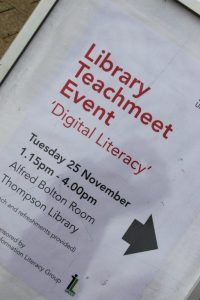
Eleanor Johnston, Academic Skills Librarian at Staffordshire University, has written the following post about last month’s Teachmeet, which was sponsored by the CILIP Information Literacy Group.
On 25th November 2014, Staffordshire University hosted a Library Teachmeet in the Thompson Library, Stoke-on-Trent. This was the latest in a series of Teachmeets that have been running for just over one year. This most recent event had the theme of ‘Digital Literacy’ and was sponsored by the CILIP Information Literacy Group, who generously provided the lunch. There was no charge to attend this event.
We had a full house of attendees and our speakers represented the University (Julie Adams and Dr Barbara Emadi-Coffin) as well as educational institutions from as far afield as Hertfordshire and Teeside. Our speakers gave us a wide ranging mix of talks, and their work in the areas they spoke on is extensive, detailed and illuminating. We are fortunate to be able to share with you their presentations, links to learning materials and handouts on our libguide. This will enable you to take a bit of time to see a more detailed picture of their work.
An overview of speakers and topics can be found below.
1. After a welcome from Alison Pope, first up speaking was Anthony Beal, the Jisc eLearning Adviser. He spoke on What makes a digitally fluent learner?
Anthony talked about the history of the term Digital Literacy and found a description from as early as 1997. He has created a Scoopit page for digital literacy, relevant to HE and FE and talked about digital fluency in theory and in practice.
View his full presentation.
2. Iain Baird, Academic Librarian (Health and Social Care) Teesside University. He spoke on LibGuides and Quick Guides: digital literacy at Teesside University
Digital Literacy was picked up by the university as a graduate attribute, and it was recognised that training for staff was required. Learners were keen on lunchtime sessions and wanted digital champions. They wanted to pick up at their own pace and were keen to see what other people were doing. They held a digital literacy development day and made sure Digital Literacy was on the module descriptors.
3. Julie Adams, Academic Skills Tutor (IT), Staffordshire University, who talked about the UCISA Digital Capabilities Survey 2014
UCISA (and Julie in particular) support, advise and train staff, and she is part of digital skills and development group. They formed a Digital capabilities group – and this year was the first planned survey, describing capability as ‘A condition, not a threshold’. UCISA approached 150 institutions and got over 60 responses. That was very pleasing for the time of year and the fact it was a first time survey. They got all different types of institutions to take part. They have 12 institutions they will be investigating in more detail.
A webinar was held on 3rd December to discuss the findings of the survey and the Executive Summary has now been published. The full report will be issued in January 2015 and will be supplemented by a set of case studies which will explore themes, issues and good practice. The results from the survey are being presented at a number of events.
4. Dr Barbara Emadi-Coffin, Principal Lecturer, Creative Communities Unit, Staffordshire University, on Researching Politically Sensitive Topics
Staffordshire University teaches modules on ‘Human rights’ and ‘Iran’ for MoD Tri Services Academy.
5. Beryl Stanley, Liaison Librarian – Health Sciences, Liverpool University on Digital Champions
The University received project funding for third years to teach first years. These digital champions created videos, gave them support then they ran drop-in sessions.
6. Emily Shields, Deputy Library Services Manager, Manchester Metropolitan University, rounded off the afternoon with a presentation on MMU’s Digital Literacy
MMU were aware that if staff were engaging in good practice, this was filtering through to their students. Digital Literacy was an important issue and initially Human Resources came up with the ‘threshold standards’ required of staff. As the project ran its course, it was kick started again by the library, who recognised that they could do this training and development online on Moodle, teaching very basic skills. They tried not to make too much new work by repurposing lots of Information Literacy materials and highlighting skills and resources that were currently available but required promotion or training.
The Teachmeets have proven to be informative and successful, and the Staffordshire University project group are already planning Teachmeets for the Spring and Summer terms in 2015, with themes including libraries and technology. We will keep you posted and hope to see you sometime in the future!
